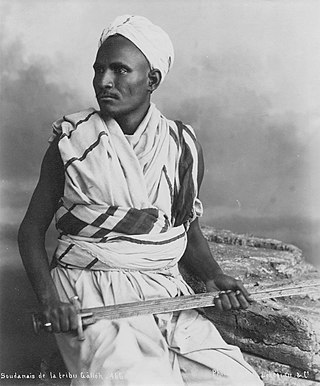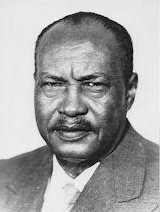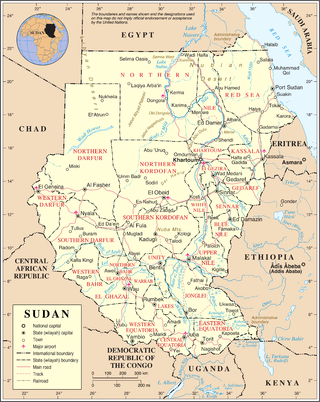
Omdurman is a major city in Sudan. It is the most populous city in the country, and thus also in the State of Khartoum. Omdurman lies on the west bank of the River Nile, opposite and northwest of the capital city of Khartoum. It is on the Nile river and acts as an important road hub, with the Nile boosting transportation even further.
Nubians are an ethnic group indigenous to the region which is now northern Sudan and southern Egypt. They originate from the early inhabitants of the central Nile valley, believed to be one of the earliest cradles of civilization. In the southern valley of Egypt, Nubians differ culturally and ethnically from other Egyptians, although they intermarried with members of other ethnic groups, especially Arabs. They speak Nubian languages as a mother tongue, part of the Northern Eastern Sudanic languages, and Arabic as a second language.

El Rashid El Tahir Bakr was born in the Karkoj Blue Nile region of Sudan. In 1958 he graduated from the Khartoum University Law Faculty. He was Vice President of Sudan and Prime Minister of Sudan from 11 August 1976 until 10 September 1977. He was the chairman of the legislature from 1974 to 1977 and from 1980 to 1981. He was Foreign Minister of Sudan from 1977 to 1980.

Wādī Ḥalfā is a city in the Northern state of Sudan on the shores of Lake Nubia near the border with Egypt. It is the terminus of a rail line from Khartoum and the point where goods are transferred from rail to ferries going down the lake. As of 2007, the city had a population of 15,725. The city is located amidst numerous ancient Nubian antiquities and was the focus of much archaeological work by teams seeking to save artifacts from the flooding caused by the completion of the Aswan Dam.

The Ja'alin, Ja'aliya, Ja'aliyin or Ja'al are an Arab or Arabised Nubian tribe in Sudan. The Ja'alin constitute a large portion of the Sudanese Arabs and are one of the three prominent Sudanese Arab tribes in northern Sudan - the others being the Shaigiya and Danagla. They trace their origin to Ibrahim Ja'al, an Abbasid noble, whose clan originally hailed from the Hejaz in the Arabian Peninsula and married into the local Nubian population. Ja'al was a descendant of al-Abbas, an uncle of Muhammad. The Ja'alin formerly occupied the country on both banks of the Nile from Khartoum to Abu Hamad. According to a source, the tribe allegedly once spoke a now extinct dialect of Nubian as late as the nineteenth century. Many Sudanese politicians have come from the Ja'alin tribal coalition.

Kosti is one of the major cities in Sudan that lies south of Khartoum, the capital of Sudan, and stands on the western bank of the White Nile river opposite Rabak(the capital of the White Nile state)where there is a bridge. The city is served by Kosti Railway Station and Rabak Airport.

Sayed Abdallah Khalil was a prominent Sudanese politician who served as the second Prime Minister of Sudan.
Nubia is the term commonly used by scholars to refer to the land located south of Ancient Egypt, from the city of Elephantine down to modern-day Khartoum. Nubia has been one of the earliest humanly inhabited lands in the world. Its history is tied to that of Egypt, from which it became independent in the 10th century BC. The rich gold deposits in Nubia made the latter the target of Ancient Egyptians, Greeks, Romans and later Arabs. Research on Nubia has allowed scholars to find several of its references.
Republican Brotherhood was a small, but influential political party in Sudan. The party was founded in the 1945, by Mahmoud Mohamed Taha. The party came into the limelight in 1983, as Taha opposed the implementations of sharia laws by Jaafar Nimeiry. Taha was arrested and executed in 1985. The party continued to exist for a few years, being disbanded sometime after 1989.

Nubia is a region along the Nile river encompassing the area between the first cataract of the Nile and the confluence of the Blue and White Niles, or more strictly, Al Dabbah. It was the seat of one of the earliest civilizations of ancient Africa, the Kerma culture, which lasted from around 2500 BC until its conquest by the New Kingdom of Egypt under Pharaoh Thutmose I around 1500 BC, whose heirs ruled most of Nubia for the next 400 years. Nubia was home to several empires, most prominently the Kingdom of Kush, which conquered Egypt in the eighth century BC during the reign of Piye and ruled the country as its 25th Dynasty.
Makk, also spelled mak, mek or meek, is a title formerly used in the Sudan, meaning "ruler" or "king". There are three theories of its origins. It may be a corruption of the Arabic word malik, meaning "king"; it may descend from Meroitic mk, meaning "God", appropriate to the divine kingship practised in the Sudan; or, as E. A. Wallis Budge proposed, it may be derived from Ge'ez መከሐ (mkḥ), meaning "to be glorious", making it an Ethiopian import. The territory ruled by a makk may be called a "makkdom" or "mekdom" in English.

Carolyn Fluehr-Lobban is an anthropologist and Sudanist and a co-founder and past president of the Sudan Studies Association. Fluehr-Lobban is a specialist in Islamic law, anthropology and ethics, human rights, cultural relativism and universal rights, and has authored texts books on Islamic societies and on race and racism. She is Professor Emeritus of Anthropology at Rhode Island College, Providence, Rhode Island; also a lecturer at the Naval War College. She is also a beekeeper and lectures on bees and beekeeping.

The Sudan Studies Association (SSA) is the US-based professional association for scholars of Sudan and South Sudan, with members from the United States, Canada, Sudan, South Sudan, and elsewhere. The SSA was founded in 1981 to pursue knowledge about all aspects of life in Sudan and to "foster closer ties among scholars in the Sudan, North America, Europe, the Middle East, and elsewhere." The association seeks to promote research about the dynamics that shape Sudan and South Sudan and their relationships with neighboring countries. Conferences are held annually in North America. In addition, international conferences have in recent years been convened in collaboration with the Society for the Study of the Sudans UK (SSSUK) in Durham, England (2000), Washington DC (2003), Bergen, Norway (2006), Pretoria (2009) and Bonn (2012).
El Mek Nimr, also known as Nimr Muhammad, was the last mek (king) of the Ja'alin tribe, who resided in Shendi, Sudan. After first having joined the Egyptian army during the Turkish rule in Sudan, he later defeated their troops and finally went into exile.
Bishop Philip Abbas Ghaboush was a Sudanese Bishop and politician. He was born in Sudan in 1922 and died in London in 2008 at the age of 86. He used both politics and religion as strength to struggle for his Nuba people.for almost five decades. HE was born in Omdurman and he descends from the Ama people of Nuba Mountain of Southern Kordufan.

Selima Oasis is an oasis in the Sudan located 90 kilometres (56 mi) west of the Third Cataract of the Nile and the ancient site of Amara West. It lies along the Darb al-Arbaʿīn, a desert track linking Kordofan with Egypt. Just to the north of Selima, the track splits into a northern route going to Kharga Oasis and a northwestern route going to Dunqul Oasis.
In early August 1988, severe floods struck Khartoum, the capital of the Sudan. On August 4, the Khartoum area received 8.4 inches of rain in 24 hours, more than twice the usual annual rainfall. Heavy rains also fell on August 11 and 13. The rains and subsequent ground flooding destroyed an estimated 127,000 dwellings that had housed approximately 750,000 inhabitants. In addition, food and water supplies, sanitation, transportation, and communications were seriously disrupted. Eighty people died in the flooding.
Mihera Bint Abboud was a 19th-century Sudanese female poet and warrior, celebrated as a heroine for her attitude of resistance to the Turco-Egyptian invasion of Sudan.

Sudanese nationality law is regulated by the Constitution of Sudan, as amended; the Sudanese Nationality Law, and its revisions; and various international agreements to which the country is a signatory. These laws determine who is, or is eligible to be, a national of Sudan. The legal means to acquire nationality, formal legal membership in a nation, differ from the domestic relationship of rights and obligations between a national and the nation, known as citizenship. Nationality describes the relationship of an individual to the state under international law, whereas citizenship is the domestic relationship of an individual within the nation. In Sudan, nationality is often equated with ethnicity, despite recognition of the legal definitions. Sudanese nationality is typically obtained under the principle of jus soli, i.e. by birth in Sudan, or jus sanguinis, born to parents with Sudanese nationality. It can be granted to persons with an affiliation to the country, or to a permanent resident who has lived in the country for a given period of time through naturalization.









